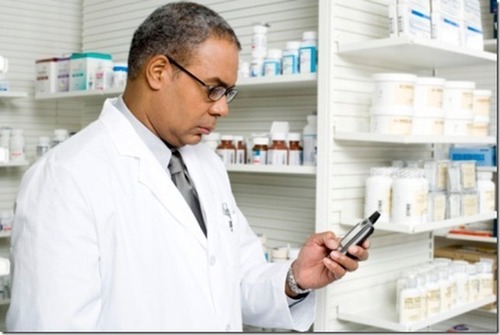Fitbit study: UK adults find mobile health tracking, not public messaging, effective | mobihealthnews
16/11/2013La vente en ligne de médicaments contrefaits profite-t-elle à Google ?
16/11/2013The physician will text you now: Follow ups from the doctor in your mobile phone
The doctor will text you now. Social media has finally developed a post-emergency room (ER) follow-up that works. Diabetic patients treated in the emergency department who were enrolled in a program in which they received automated daily text messages improved their level of control over their diabetes and their medication adherence, according to a study published online today in the Annals of Emergency Medicine. You can check out the study or its abstract, « Trial to Examine Test Message Based mHealth in Emergency Department Patients with Diabetes (TExT-MED): A Randomized Controlled Trial. »
In the past decade, many doctors also have used email to send the results of physical exams and blood tests to patients by posting the results on a website that can be accessed only by patient and doctor. Now, social media and mobile phones are so widespread in the population, that doctors are texting patients for their follow ups that follow them up for six months.
Doctors can use social media to remind patients to be more self-sufficient when it comes to taking responsibility to be healthier instead of thinking, « I’ll let the doctor take care of my problem. » Or like the TV advertisement for certain drugs said, « I’ll do my job and let my doctor do his. » When the doctors text patients for six months, it keeps patients reminded of how to manage their health better, or at least reminds them of what they’re supposed to do when managing a health problem such as type 2 diabetes.
« Our results were especially pronounced for Latinos, who are twice as likely as non-Latinos to develop diabetes, » explains the lead study author Sanjay Arora, MD, of the Keck School of Medicine at the University of Southern California in Los Angeles, according to the November 11, 2013 news release, The doctor will text you now: Post-ER follow-up that works. « These patients, when followed up by text messages for 6 months, improved enough to reduce their dependence on the emergency department for care of their diabetes. Text messaging is effective, low-cost and widely available for our patients who often have no other source of medical care. »
Patients received text messages for half a year
Adult patients with poorly controlled diabetes who visited an urban, public emergency department for care received two daily text messages for 6 months. For patients who received the text messages, blood glucose levels decreased by 1.05 percent and self-reported medication adherence improved from 4.5 to 5.4 (on an eight-point scale). Effects were even larger among Spanish speakers for both medication adherence and blood glucose levels.
The proportion of patients who visited the emergency department was lower in the text messaging group (35.9 percent) than in the control group (51.6 percent). Almost all (93.6 percent) patients enrolled in the program reported enjoying it and 100 percent reported that they would recommend it to family and friends.
The text messaging program is called TExT-MED
The text messaging program, called TExT-MED, included daily motivational messages such as « Having diabetes can lead to a heart attack or stroke – but it doesn’t have to » and « Eat more fruits, vegetables, beans and whole grains and less salt and fat. » In addition, it provided three medication reminders per week, two healthy living challenges per week and two trivia questions per week, designed to build diabetes awareness (sample: « Trivia » Eating too much sugar and other sweet foods is a cause of diabetes. A. True. B. False. »).
« Diabetes is emerging as a public health epidemic, particularly in low-income, underserved inner city and minority populations who depend on safety-net systems for medical care, » says Dr Arora in the news release, The doctor will text you now: Post-ER follow-up that works. « Our goal is to transition our patients from crisis management to long-term diabetes management. In the absence of other health care options, reaching our patients by text message makes us partners in handling their disease and improves their quality of life. »
See on www.examiner.com




